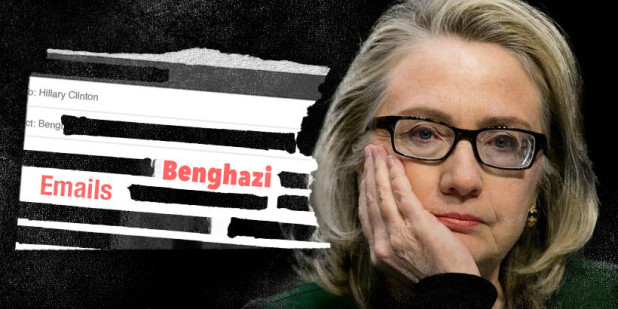Andrew Anglin
Daily Stormer
August 30, 2016
The bathroom email server crisis of Hillary Clinton, a noted US Presidential candidate and fat, stupid old bitch, has continued even while the Clinton Foundation’s pay-to-play scandal has become her primary problem in recent weeks.
It seems now the feds have finally been able to recover some of the emails she deleted when he was clearing her server for turnover to them. This was destruction of evidence, of course, but she was not prosecuted for it because our government has become a third-world style corrupt joke.
The question for a long time has been: what exactly was she doing that she didn’t want to be on public record through the government’s official email servers?
She has said that it was for convenience that she kept a private server in her bathroom, which is obviously complete nonsense. Running a server in your bathroom is not easier than simply logging into a state webmail account.
She also claimed that the emails she deleted were all personal, which is a silly joke. Why would she risk being charged with a federal crime – possibly even espionage – over personal emails? Even if they contained embarrassing stuff, such as some type of demented sexual behaviors, this would be sealed and no one would ever see it except federal investigators.
Now, we may be getting closer to answers about what sort crimes she was hiding on this hidden bathroom server.
Approximately 30 of the 14,900 deleted emails recovered by the FBI from Hillary Clinton’s private email server may involve the 2012 attack on Benghazi, Libya, State Department lawyers said on Tuesday.
An undetermined number of those 30 emails were not included in the cache of 30,000 the former secretary of State voluntarily turned over to the State Department in 2014, government lawyers told U.S. District Court Judge Amit P. Mehta, according to multiple reports.
The agency has committed to releasing the newly uncovered documents under a series of Freedom of Information Act (FOIA) requests from the conservative watchdog group Judicial Watch, but first it must weigh whether the emails are personal or work-related. Some may also be duplicates of the thousands it has already released.
“Using broad search terms, we have identified approximately 30 documents potentially responsive to a Benghazi-related request,” State Department spokesman John Kirby said in a statement. “At this time, we have not confirmed that the documents are, in fact, responsive, or whether they are duplicates of materials already provided to the Department by former Secretary Clinton in December 2014.”
State Department lawyers said Tuesday it will need until the end of September to review and redact any classified information from the new emails. Mehta pressed the agency on why it would take so long to process so few documents and ordered the department to return in a week with more details about why it needs a full month.
The hearing was held in one of several FOIA lawsuits brought by Judicial Watch now revolving around the newly uncovered 14,900 emails.
It remains unclear how many of the recovered emails will be deemed part of the agency’s record by the State Department, clearing the way for their release, and how long that review process will take.
Judicial Watch has pressed for responsive documents to be made public before the presidential election, but it is still unclear whether all of them will be released by Nov. 8.
The State Department has pushed back on calls to expedite the review and production process, citing the gargantuan nature of sorting through and redacting tens of thousands of pages.
In a separate case, a federal judge in Florida last week ordered that the State Department must start releasing any communications between Clinton and the White House in the days surrounding the Benghazi attack by Sept. 13.
In yet another case, a federal judge in D.C. will set a production schedule for the new documents more broadly on Sept. 23.
The 14,900 documents were found during the course of the FBI’s investigation into the Democratic presidential nominee’s use of a personal email server during her time at State.
Investigators pieced together deleted emails from Clinton’s correspondence with other officials and reconstructed “fragments” from old servers and machines connected to her email domain.
Republican nominee Donald Trump’s campaign quickly used reports of the 30 Benghazi-related emails to blast Clinton for deleting around half of her emails in 2014.
“Clinton swore before a federal court and told the American people she handed over all of her work-related emails. If Clinton did not consider emails about something as important as Benghazi to be work-related, one has to wonder what is contained in the other emails she attempted to wipe from her server,” senior communications adviser Jason Miller said in a statement.
Yeah, she perjured herself innumerable other times as well during this process.
#MakeAmericaGreatAgain #ImWithYou pic.twitter.com/IoYMdjvWHf
— Donald J. Trump (@realDonaldTrump) August 29, 2016
 Daily Stormer The Most Censored Publication in History
Daily Stormer The Most Censored Publication in History



